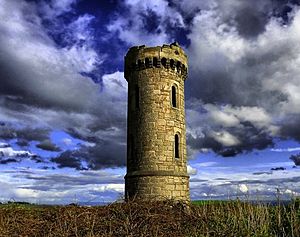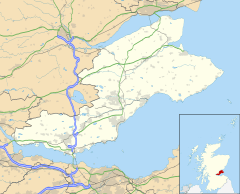Oakley, Fife facts for kids
Quick facts for kids Oakley |
|
|---|---|
 Blair Tower, north-east of Oakley |
|
| Population | 2,240 (2020) |
| OS grid reference | NT0388 |
| Council area | |
| Shire county | |
| Country | Scotland |
| Sovereign state | United Kingdom |
| Police | Fife |
| Fire | Fife |
| Ambulance | Scottish |
| EU Parliament | Scotland |
| UK Parliament |
|
| Scottish Parliament |
|
Oakley is a village in Fife, Scotland. It is located about 5.5 miles (9 km) west of Dunfermline on the A907 road. The village sits where the areas of Carnock and Culross meet.
Oakley was first built because of the Forth or Oakley Ironworks in 1846. These ironworks, which made metal, had six tall furnaces. Later, the buildings were used as a sawmill to produce wood for things like railway sleepers. The village was also important for coal mining. The Comrie Colliery, a large coal mine, closed in 1986. It took many years for Oakley to recover after this major employer shut down.
Contents
Life in Oakley
Oakley has many useful places for its residents. There are three parks for playing and relaxing. One park is next to the community centre and has special astroturf sports pitches. You can also find Blairwood Park, which is the home football ground for Oakley United.
Nature and Walks
A cycle track runs through the village. This path used to be a railway line that went from Dunfermline to Stirling. It's now a great way to explore the local countryside.
Two small rivers, called burns, meet in the south-west of Oakley. These are the Blair Burn and the Carnock Burn. They create another nice area for walking. The Blair Burn separates Oakley from the nearby village of Comrie. The Carnock Burn divides the eastern part of Oakley.
Shops and Services
You'll find a Co-Operative store in Oakley, which also works as a Post Office. There are two hair salons, a bakery, a butcher shop, and a pharmacy. If you're hungry, there are three hot food takeaways and a café. You can also find a few other grocery stores for your daily needs.
Churches and Community
Oakley has two churches. The Holy Name Catholic Church was built between 1956 and 1958. It was designed by Charles W Gray and has beautiful stained-glass windows by Gabriel Loire, a famous French artist. This church was built for Catholic miners who moved to Fife for work. The Oakley Parish Church is a smaller church for Protestants. It is also used for many community activities for all ages.
Homes and Jobs
Most of the homes in Oakley were built in the 1950s for the miners who moved to the area. Many people who live in these houses now own them. In the centre of the village, there is a pub called The Greyhound Bar. There is also a Social Club on the main A907 road. A small industrial area to the north of the village provides some local jobs.
To the south of Oakley is Inzievar House. The famous writer Jules Verne once visited this house. Today, it has been turned into flats. There is also a busy wood industry in the area, run by Scottish Woods.
Education
Oakley used to have two primary schools: Holy Name (Roman Catholic) and Inzievar primary. Now, both schools and the local library are together in a new building called Oakley Campus.
Public Library
The library is located inside the Oakley Campus. It has books and information resources for the community. You can also use the internet there. The library has specific opening hours.
Transport
Stagecoach buses provide transport services in Oakley. The 4 and 4A bus services run frequently from the new Dunfermline Bus station. They operate from early morning until late at night.
See also
In Spanish: Oakley (Fife) para niños
 | Janet Taylor Pickett |
 | Synthia Saint James |
 | Howardena Pindell |
 | Faith Ringgold |


